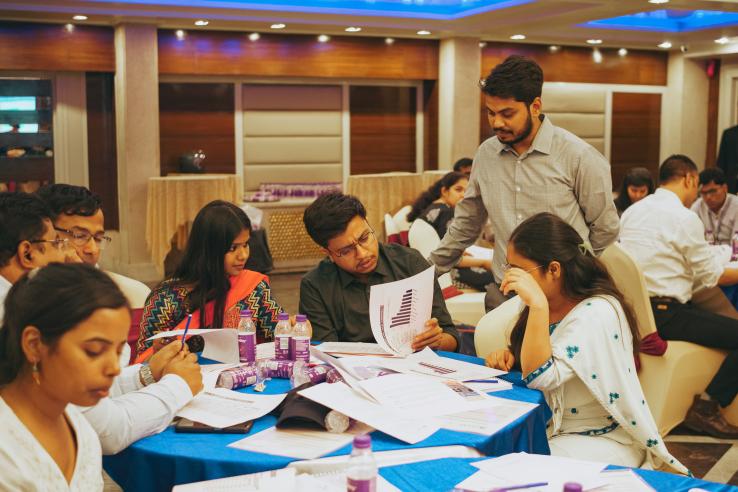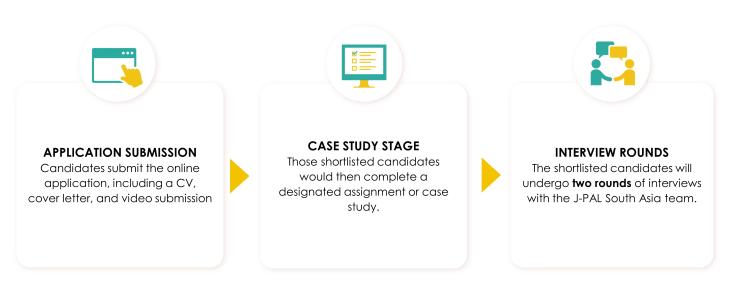ASPIRE forward: Join us as a fellow


The Alliance for Scaling Policy Impact through Research and Evidence (ASPIRE) is a coalition of governments, philanthropic organizations, civil society groups, and research institutions hosted by J-PAL South Asia. ASPIRE is working to scale up effective programs that tackle some of India’s biggest development challenges.
ASPIRE is looking for fellows, for 24 months, to work with J-PAL South Asia’s network of researchers, government partners, and civil society organizations, to embed evidence-based programs at scale, in partnership with the government.
Applications will be screened on a rolling basis.
About the opportunity
This opportunity will equip young professionals in or looking to transition to the development sector, with knowledge of how evidence-based programs are designed and give them hands-on experience in driving social policies and programs.

As a fellow, you will be a part of:
Stakeholder management
Communicate with state officials and partner organizations to support the dissemination and scale-up of evidence-based policies.
Program management
Collaborate with government line departments and partner organizations to support scale-up goals. Summarize monitoring efforts and program evidence, and assist with dissemination.
Technical assistance
Write reports, optimize processes, create policy memos, manage project data, and coordinate between line departments.
Support organizational learning
Promote locally contextual evidence and develop pathways for scaling evidence-based interventions at J-PAL South Asia.
Meeting preparation
Assist in preparing for government meetings by creating slide decks, writing notes, and coordinating with government officials and implementing organizations.
What projects will the fellow be a part of?
Government of Karnataka - Education Fellow
EVERY CHILD COUNTS PROGRAM
J-PAL South Asia, Key Education Foundation, and Department of School Education, Karnataka are jointly piloting and scaling an early years play-based Math curriculum in Grade 1 classrooms across Karnataka. This curriculum, originally developed by Professor Elizabeth Spelke at the Harvard Laboratory of Developmental Studies has been adapted to India through a series of 3 randomized evaluations in Delhi between 2013-2019 by Professor Spelke, Nobel Laureate Esther Duflo, and Dr. Harini Kannan.
GANITHA GANAKA PROGRAM
J-PAL South Asia will be working with the Government of Karnataka on the “Ganitha-Ganaka” program. As a research and knowledge partner, we will support the government’s push to make children “like and learn mathematics.” The program was announced as part of the state budget 2024 – 25 and will be introduced for children studying in grades 3, 4, and 5 in all government schools across 93 aspirational blocks in academic year 2024 - 25.
Ganitha Ganaka is informed by evidence on 'ConnectED,' a one-on-one phone tutoring program that randomized evaluations led by J-PAL affiliated and Youth Impact researchers found to be effective and cost-effective in improving math learning and parental engagement. The program delivers math problems to children studying in grades 3, 4, and 5 through text messages every week, accompanied by a 25-minute phone tutorial session. These lessons cover basic math operations and are tailored to each student's previous knowledge and performance.
Fellow requirements: Will be based in Bangalore, India and requires written and oral fluency in Kannada and English
Every Child Counts
J-PAL South Asia, Pratham Education Foundation, and Department of School Education, Andhra Pradesh are jointly piloting and scaling an early years play-based Math curriculum in Grade 1 classrooms across Andhra Pradesh. This curriculum, originally developed by Professor Elizabeth Spelke at the Harvard Laboratory of Developmental Studies, was adapted to India through 3 randomized evaluations in Delhi between 2013 and 2019 by Professor Spelke, Nobel Laureate Esther Duflo, and Dr. Harini Kannan.
Fellow requirements: Will be based in Vijayawada, Andhra Pradesh, and requires written and oral fluency in Telugu and English.
Gender Equity Curriculum
J-PAL South Asia and Breakthrough have partnered with the Government of Odisha’s School and Mass Education Department to integrate a gender equity curriculum, 'Barnali', for adolescents into the syllabus for all (23,000) government schools for students of grades 6 to 10 in Odisha. Breakthrough is the technical partner, supporting the School and Mass Education Department in implementing the curriculum. J-PAL SA is the knowledge and learning partner to ensure the program is on track to meet its objectives. The tripartite partnership was launched in 2022, and the curriculum is set to be launched in the 2024-25 academic year within the Social Studies classes as a supplementary textbook.
Fellow requirements: Will be based in Bhubaneshwar, and requires written and oral fluency in Oriya and English.
Satat Jeevikoparjan Yojana
The Government of Bihar launched the Satat Jeevikoparjan Yojana (SJY) in 2018, to combat extreme poverty in Bihar. SJY is based on the Graduation Approach, a multi-faceted and holistic livelihoods program specifically designed for the poorest of the poor.
The program is implemented and led by JEEViKA. It is run in close collaboration with Bandhan-Konnagar as the technical advisor and J-PAL South Asia as the knowledge and learning partner. J-PAL South Asia supports the program through process evaluation and knowledge management, conducting evaluation studies, impact assessments, and documenting process learning to strengthen program operations.
Fellow requirements: Will be based in Patna, and requires written and oral fluency in Hindi and English.
Who can apply?
This opportunity is ideal for individuals with knowledge of the development landscape, strong communication and stakeholder management skills, a passion for translating research into action, creativity, and a keen interest in development.
Education
Master's degree (preferably in economics, public policy, or international development). A strong technical understanding of randomized evaluations is necessary.
Experience
Minimum two years of work experience and a relevant Master's degree.
Minimum four years work experience in addition to a relevant Bachelors.
Experience working with government partners and other stakeholders will be strongly favored.
Understanding monitoring and evaluation
Demonstrate a keen understanding of the value of randomized evaluations, monitoring techniques, and their usefulness for policy decisions.
Skills and competencies
- Communication: Attention to detail and excellent writing and presentation skills for communicating policy lessons from academic papers in ways that policymakers understand. This requires clear, precise, non-technical writing, and creativity in presentation.
- Time management and prioritization: Proven ability to handle several different projects/tasks at one time, complete tasks assigned, and meet deadlines.
- Language: Fluency in English (written and oral) and fluency in Hindi (written and oral) will be considered favorably; please indicate proficiency in any other regional language in the application form.
Why apply?

How to apply?
Complete and submit the application form.
For questions regarding:
- The opportunity or application, contact [email protected] or [email protected]
